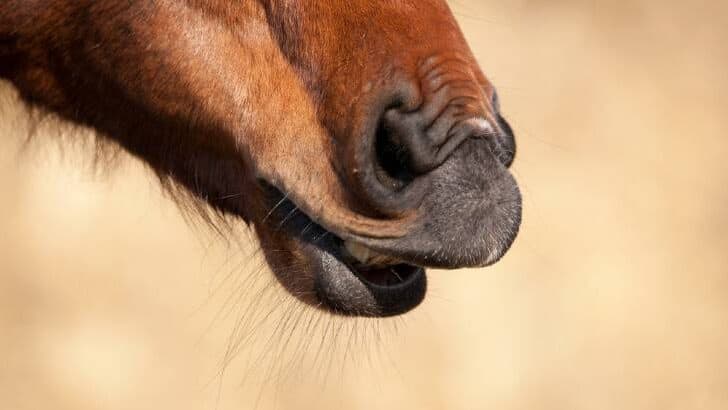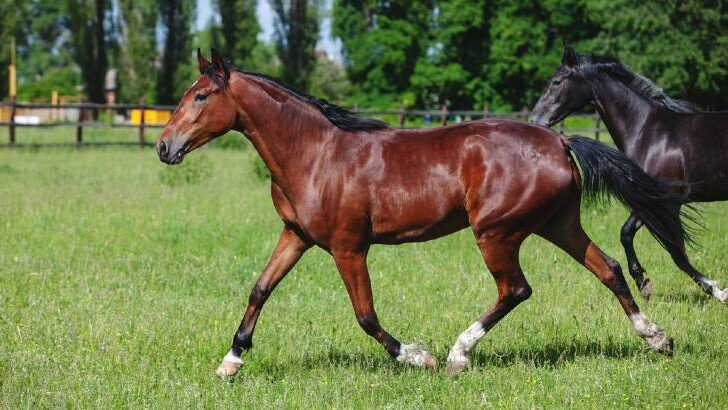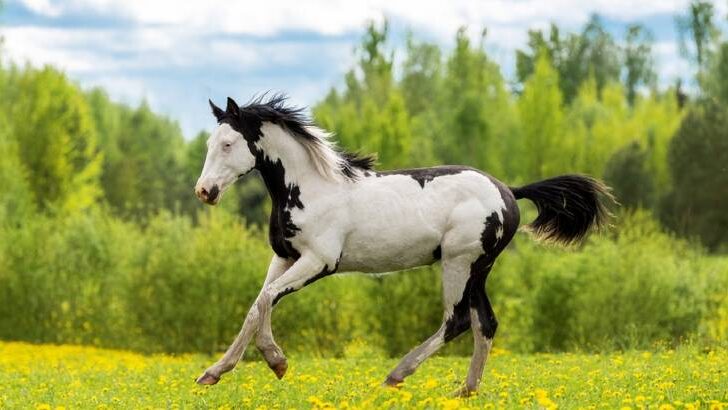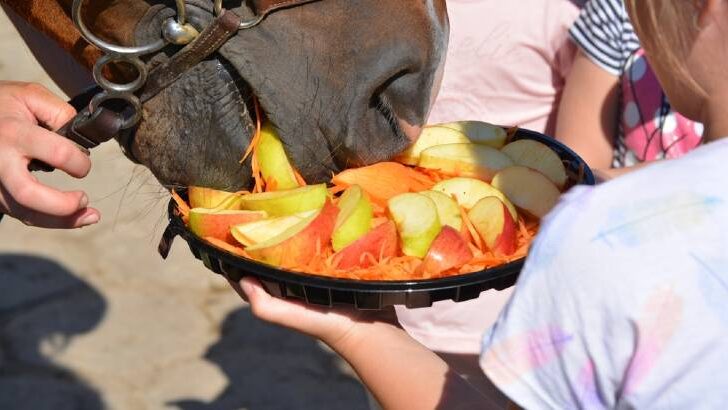Affiliate Disclaimer
As an Amazon Associate I earn from qualifying purchases. It helps me keep the website going. Thank you for your support.
Many horse owners know that it is impossible to hide treats from their horses. No matter how many layers of clothing the treat is hidden under, the horse is able to sniff it out. Horses have a sense of smell much better than ours and have many smells they like. However, are there any smells horses hate?
Horses use smell to help them survive in the wild. Many of the smells horses hate are directly linked to their survival in the wild. These smells are not commonly found in domestic equine environments. However, there are many other smells horses dislike, and the list depends on each horse individually.
There is a difference between which smells horses hate, and which ones they simply dislike or avoid. Read on to learn more about these smells, and how horses used smell to help them survive.
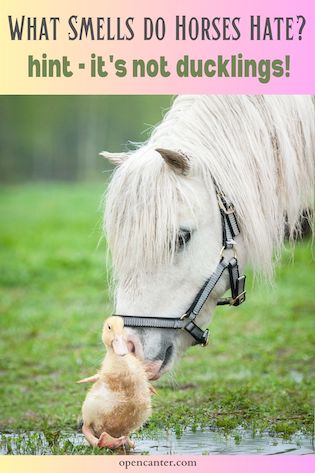
How Good is a Horse’s Sense of Smell?
A horse’s sense of smell is much better than ours. It is estimated that horses can smell about 50 times better than humans.
There is little scientific research comparing horses to other animals when it comes to smell. However, it is thought that horses have around 300 million receptors in their nostrils, compared to five to six million in humans. Research has also shown that the area of the brain responsible for processing smell is relatively large in horses (source).
Horses are also equipped with large, flexible nostrils, that can flare to inhale as much air as possible. When a horse sniffs something, they can create a stronger current of air in their nostril. This draws in more scent and gives the horse more time to interpret what it means.
Horses also have another internal system, known as the vomeronasal organ. This is a specialized organ that analyses specific messages hidden in scents. These are called pheromones; chemical messages that are designed to influence the behavior of another horse.
When horses detect pheromones, they may display the Flehmen response. This is where the horse extends its neck and head upwards, and curls back its upper lip. It’s thought that the movement helps the pheromones reach the vomeronasal organ (source).
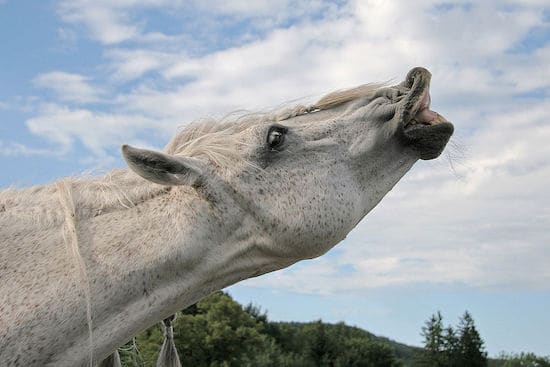
The Flehmen response is most commonly seen in stallions or geldings when a mare in season is nearby. The mare will release pheromones through sweat or urine. Mares who are in season will usually urinate more often, especially if there are male horses nearby. The stallion or gelding will detect the pheromones and know that the mare is ready for breeding.
Pheromones also help horses to know the gender of their herd mates. Stallions and geldings release different pheromones to mares, which is how mares know not to ‘flirt’ with other mares.
Why do Horses Have Such a Good Sense of Smell?
Horses depend on their sense of smell for survival. They use smell to help them decide when to breed, what to eat or drink, and to detect predators.
Many owners have experienced their horses refusing to eat their feed when something new is added. A horse’s sense of smell is designed to help them avoid moldy feed and poisonous plants. They are easily able to detect a new supplement or medication in their otherwise normal feed.
Often, horses won’t even try their feed when something smells off. To them, it smells different and perhaps is no longer safe for them to eat. Some horses become accustomed to the new smell and taste over time, with the help of flavorings like molasses.
However, other horses will refuse to eat the supplement at all. Horses can also detect predators using scent. They use their ability to draw in large amounts of air to detect smells from some distance away. Horses can also identify which direction the smell came from (source).
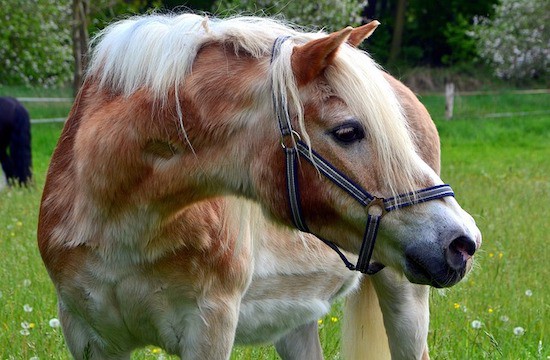
What are Some Smells Horses Hate?
There are a number of smells horses hate. These smells will often result in the display of either fearful or aggressive behavior. This is because most of the smells horses hate are also indicators of a threat to their life.
The smell of predator urine or feces is a smell horses hate. This is because horses are prey animals, and in the wild are hunted by many predators. These predators include lions, bears, wolves or coyotes, foxes, or any other carnivorous animal.
The presence of this smell means that a predator is likely nearby, and the horse needs to move to safety. A similar reaction is seen when horses smell blood or smoke, as these smells mean danger.
In the wild, stallions hate the smell of another stallion. They feel the need to protect their herd, and will either move the herd away or seek out the other stallion.
Wild stallions will fight to determine who is more dominant, sometimes to the death. Fighting is not commonly seen in domestic horses, due to management practices.
Most horses dislike strong smells, but some horses show a stronger reaction, especially when the smell is unfamiliar. The horse cannot determine what the smell means and if it is a threat or not.
It’s unknown if horses share the same hate as humans when it comes to offensive smells like a smelly rubbish bin or bad body odor. It can be assumed that horses don’t find these smells pleasant. However, most horses will appear indifferent as these smells, in most cases, aren’t something that indicates a threat to life.
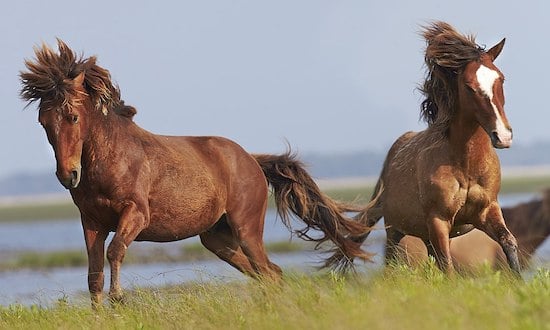
What are Some Smells Horses Dislike?
Horses also use smell to tell them what things to avoid. These smells don’t cause the horse to react with fear or aggression. Instead, they tell the horse simply to avoid whatever is creating the smell.
Smells horses avoid include moldy or rancid feed. This is a survival mechanism that helped the horse avoid being poisoned or developing colic. Domestic horses exhibit the same behavior and will refuse to eat feed that is moldy or has gone bad.
This often extends to the smell of supplements or medications. Even though we know they are safe to eat, the horse does not. They identify that something smells different and refuse to eat their food as it could be contaminated.
Horses will also refuse to eat certain plants based on their smell. This helps them to avoid plants that are poisonous in their natural environment. However, there are some instances where horses will eat poisonous plants. This is usually because there is no other food source in the horse’s environment.
Most horses also dislike strong smells like vinegar, perfume, or eucalyptus oil. They also show a dislike for petrol or diesel fumes. This is likely because these scents are very strong, and overpower other smells in the environment. They don’t carry any particular meaning for most horses.
It is worthwhile considering that horses do not like strong smells because they can hide other smells in the environment. Horses use smell to identify predators from a distance – this will be difficult if there is an overpowering smell nearby.
Do all Horses Hate the Same Smells?
In some instances, yes. All horses hate the smells of blood, predators, and smoke. Horses hate these smells because they mean danger and threat to the horse’s life.
Similarly, all horses dislike the same smells regarding poisonous plants, dirty water, and moldy or rancid feed. These dislikes are also part of the horse’s evolved behavior and all horses share similar traits.
Their prey animal characteristics also mean that most horses are likely to share similar reactions to strong and/or unfamiliar smells.
However, like people, preferences for other smells vary between individuals. Some horses may tolerate strong smells like eucalyptus oil better than others. Some horses might find vinegar highly offensive, while others appear indifferent.
Why Should I Know What Smells Horses Hate?
It’s important to know what smells horses hate so that you can avoid bringing them into your horse’s environment. Doing this can help your horse feel more relaxed around you. It can also help maintain your horse’s health, by avoiding things like moldy feed.
Scents could be used to deter horses from entering certain areas, but you need to be careful about what smell you use. Avoid using one of the smells horses hate, like smoke or blood, as this will likely cause the horse stress. This will be especially true if the horse is in a confined area, and cannot escape the smell.
You might need to experiment with different strong smells to find out what works best. Remember, the goal is that the horse avoids the area, but is not stressed by the scent. Be aware that over time, the horse may learn to associate the area with the unpleasant smell. This could mean that even after the scent is gone, the horse will still avoid the area.
There have been stories of strong smells being used to help mares bond with orphan foals. To assist in the initial introduction, a strong-smelling substance is applied to the mare’s nose. This masks the fact that the orphan foal does not smell the same as the mare’s own foal.
The orphan foal might also have the scent of the mare’s own foal rubbed over its body. These techniques have been developed to help avoid the mare rejecting the foal.
Final Thoughts
Horses evolved to use smell to help them survive, and have a much better sense of smell than humans. Many of the smells horses hate stem from their wild ancestors; like the smell of predators.
Understanding which smells horses hate helps us to be understanding when they react fearfully to a smell. It also means we can improve their quality of life, by avoiding bringing certain smells into our horse’s environment.

